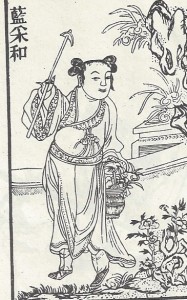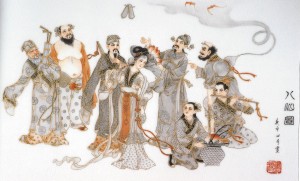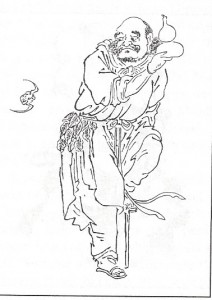RELIGION & THE SUPERNATURAL: Chinese supernatural beings
Immortals are beings who once lived as humans on earth, but now inhabit the upper stratum (sometimes called Heaven or celestial level). They have supernatural powers, can assume human shape, and are able to do anything people do—including eating and drinking.
The Eight Immortals were well-known figures by the Ming Dynasty, and remain important Taoist figures today. Even the number eight itself holds great symbolic significance. Specifically, it represents the stages and conditions of human life: age (young and old), status (low and high), fortune (poor and wealthy), and gender (male and female). The Immortals, therefore, include among their number men and women, young and old, rich and poor, simple and educated.
The Eight Immortals are:
Li Tie-guai, identified by his iron crutch and calabash (bottle gourd)
Lan Cai-he, the youngest of the eight immortals, perhaps mid-teens
He Xian-gu, the only female
Cao Guo-jiu, a mythological figure often seen with a paiban (clapper)
Lu Dong-bin, a real historical scholar and poet from the Tang Dynasty
Han Xiang-zi, identified by a dizi (Chinese flute)
Zhang Guo-lao, a real historical figure associated with old age
Zhong-li Quan, AKA Han Zong-li, often seen carrying a large fan
As with humans, these supernatural beings have frailties as well as strengths, and can both enjoy and abuse worldly delights. In Warned, the second story in the Mei-hua trilogy, the immortal Iron Crutch Li (Li Tie-guai) reveals his knowing, benevolent nature by descending to earth in order to warn Mei-hua. And yet he also enjoys his liquor a little too much—which is why he appears carrying a gourd filled with wine. Similarly, Lan Cai-he, who also comes to warn Mei-hua in Warned, holds castanets because he loves to sing and dance. In the story, Iron Crutch Li and Lan Cai-he come to help Mei-hua by alerting her to danger. At the same time, they do not solve her problems for her. That’s not their job.
While immortals and other spirits were believed to be able to play powerful roles in the natural world of Ming China, they did not control human behavior or determine a person’s destiny. Instead, supernatural beings such as the Eight Immortals operated as additional, influential actors who needed to be watched for, guarded against, or listened to.
Can you identify each of the eight immortals in the picture above?




